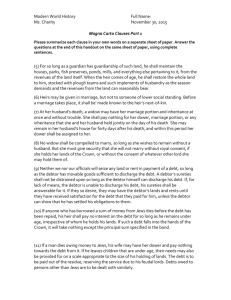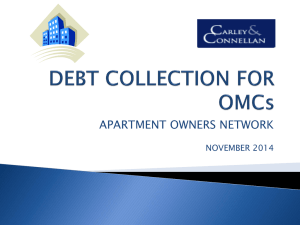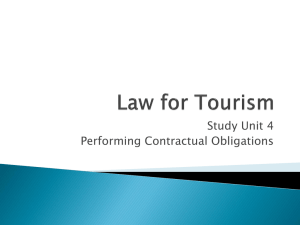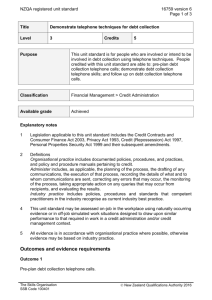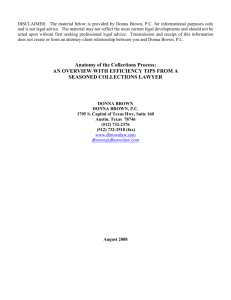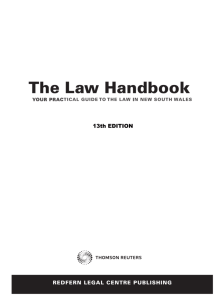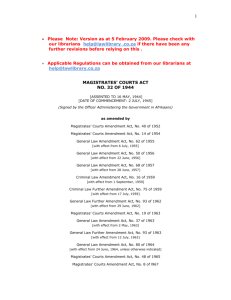EFFECTIVE IRISH COLLECTIONS
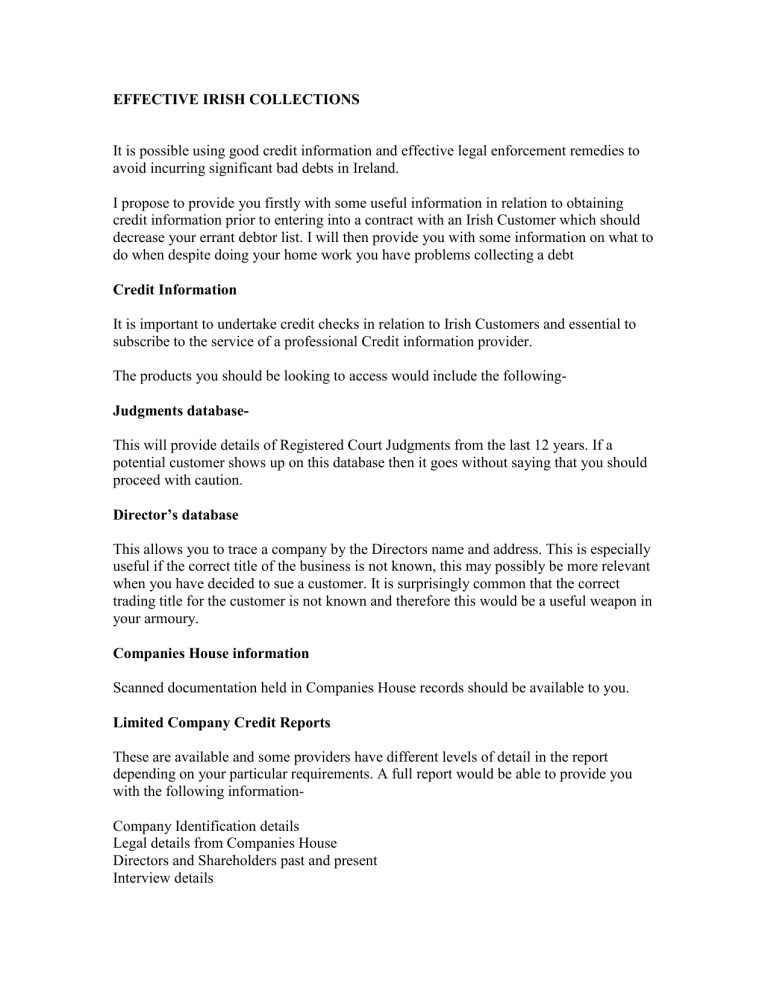
EFFECTIVE IRISH COLLECTIONS
It is possible using good credit information and effective legal enforcement remedies to avoid incurring significant bad debts in Ireland.
I propose to provide you firstly with some useful information in relation to obtaining credit information prior to entering into a contract with an Irish Customer which should decrease your errant debtor list. I will then provide you with some information on what to do when despite doing your home work you have problems collecting a debt
Credit Information
It is important to undertake credit checks in relation to Irish Customers and essential to subscribe to the service of a professional Credit information provider.
The products you should be looking to access would include the following-
Judgments database-
This will provide details of Registered Court Judgments from the last 12 years. If a potential customer shows up on this database then it goes without saying that you should proceed with caution.
Director’s database
This allows you to trace a company by the Directors name and address. This is especially useful if the correct title of the business is not known, this may possibly be more relevant when you have decided to sue a customer. It is surprisingly common that the correct trading title for the customer is not known and therefore this would be a useful weapon in your armoury.
Companies House information
Scanned documentation held in Companies House records should be available to you.
Limited Company Credit Reports
These are available and some providers have different levels of detail in the report depending on your particular requirements. A full report would be able to provide you with the following information-
Company Identification details
Legal details from Companies House
Directors and Shareholders past and present
Interview details
Press cuttings
Financial commentary
Bankers and Auditors
Trade References
Charges registered
Negative payments
Credit risk and rating
Sole Trader reports
Non limited business reports can be compiled by credit analysts. Using trade references and details obtained through interview with the subject the analyst can advise on credit exposure.
It can be seen that there is a significant amount of information available to at least allow you to make an educated decision on whether to enter into contractual relations with a potential customer.
Recovering the Debt
There is I think a reticence on behalf of creditors to effectively tackle overseas debt issues. The “Irish debt” tends to be low on the priorities of a busy credit manager and this can be fatal to your chances of collection. As we all know escalating the process of recovery of a debt is so important. The longer you prevaricate the less likely you will be able to collect.
Once the debtor has breached your credit procedures and failed to respond to your payment demands you need to do something about it and that means sending it to an Irish
Solicitor to attempt collection. In some ways it is more important to move quickly with
Irish debts than domestic debts because there is a definite tendency here to ignore foreign correspondence or collection calls. There is no doubt that a collection call made using
Irish legal terminology, such as District and Circuit Court rather than the English equivalent will be much more effective.
LEGAL ACTION
There is a hierarchy of Courts in which Legal action can be taken depending on the level of debt.
DISTRICT COURT- DEBTS UP TO €6348
Here a Civil Summons is sent to the debtor. If the debtor does not respond to the proceedings an Affidavit of debt is sworn by the Creditor and this is lodged in the Court
Office with the Judgment papers and Judgment is then issued.
If the debtor does respond to the summons by filing an intention to defend then the case is given a hearing date. Please note that Affidavit evidence cannot be given in a District
Court hearing, an appropriate witness from the Plaintiff must attend and give oral evidence before the Court. This is important to bear in mind if your witness is based overseas. After hearing both parties evidence the Judge will give his Judgment.
CIRCUIT COURT €6348 TO €38,092
Uncontested actions are similar procedure to those of the District Court. If the case is contested, unlike the District Court where there is no such requirement, the Defendant must file a written defence. After various procedural steps have been taken the matter will be listed for hearing and again both parties will give evidence and the Judge will give his/her decision. It is possible to obtain Summary Judgment in the Circuit Court on
Affidavit which avoids personal attendance by a witness. If the Judge refuses to award
Summary Judgment the case will then proceed to a full trial.
HIGH COURT €38,092 upwards
If uncontested Judgment will issue in the Court Office. If the proceedings are contested then the Master of the High Court will after reading Affidavit evidence of both parties decide if Judgment can be given. If he is not satisfied the case will be referred to a Judge for hearing.
POST JUDGMENT OPTIONS
PUBLICATION OF JUDGMENT
Publication of Judgment brings the Judgment to the attention of the public at large.
Judgments are published in the Experian All Ireland Gazette and Stubbs’s Gazette which are weekly publications. These publications are read by credit managers and Bank
Managers etc and may well result in the debtor receiving a bad credit history. The threat of publication may well persuade the Debtor to make a settlement offer to avoid them having difficulty in obtaining credit in the future. Ireland is a relatively small Country and the effect of such a publication can have a dramatic effect on a debtor’s livelihood.
THE SHERIFF
The Sheriff will seize and sell goods belonging to the Debtor to realise funds for the creditor. The Sheriff may well have significant volumes of work to process and there may be delays in execution of the Judgment taking place.
INSTALMENT ORDER PROCESS.
This is a remedy where by the debtor can be examined as to his means in the District
Court. The Judge will decide what is a reasonable amount for the debtor to pay either weekly or monthly. Once the order is made it is served on the debtor and he should make the required repayments. If he fails to make the repayments it is possible to obtain a committal Order which is a process whereby if the debtor fails to discharge the arrears under the instalment order he will be committed to prison for a period specified by the
Judge. Debtors rarely go to prison as it is highly likely that when they are contacted by the Police seeking to execute the Committal Order that they will make arrangements to discharge the debt.
The Court is unlikely to make instalment orders against debtors in hopeless financial circumstances.
JUDGMENT MORTGAGE
This is similar to the charging order in England. Once Judgment has been obtained the
Creditor can apply to register a judgment mortgage over the deeds to the Defendants property. This will prevent any dealings in the debtor’s property unless the debt is discharged. It is also possible in certain circumstances to sell the debtors property to realise the debt due to the creditor. This is a fairly lengthy process and is normally only employed where the debt is reasonably substantial.
WINDING UP OF LIMITED COMPANY
This is a similar to English procedures. A statutory demand is served giving the debtor 21 days to make payment. If the debtor fails to discharge the debt or the demand is not withdrawn then the debtor has committed an act of insolvency and the creditor is free then to proceed and issue the Winding up petition. Such proceedings can be quick and effective and the debtor may well discharge the debt to avoid Liquidation and its serious consequences. As in England this is not a suitable remedy if there is a dispute in relation to the debt.
BANKRUPTCY
This is not as common a remedy in Ireland as in England. It is expensive and time consuming and tends normally to be used as a last resort and where the debt is substantial.
MAREVA INJUNCTION
If the creditor is aware that the debtor is seeking to dissipate assets as a way of defeating a future Judgment it is possible to apply to the Court as a matter of urgency without notice to the Defendant to obtain an order securing those assets that may be in danger of being dissipated. The order may be more general in nature sometimes such as prohibiting the Defendant from reducing his assets below a certain level. This can be a very effective remedy provided the creditor is in possession of pertinent knowledge of the debtor’s assets and intentions.
There has been traditionally reluctance on the part of UK businesses to invest in collecting debts in Ireland. I am certain there have been many millions of Pounds of debt written off simply because a reply was not received to a demand letter sent from the UK.
Ireland’s economy continues to fare well after the boom days of the “celtic tiger”. Ireland continues to increase its trading links with the UK and the rest of Europe to such an extent that those involved in the credit industry cannot afford to “ignore that customer in
Ireland any more”
.
Matthew Wales. mwales@walesco.ie
www.walesco.ie
Liam Reddy info@experian.ie
www.experian.ie

